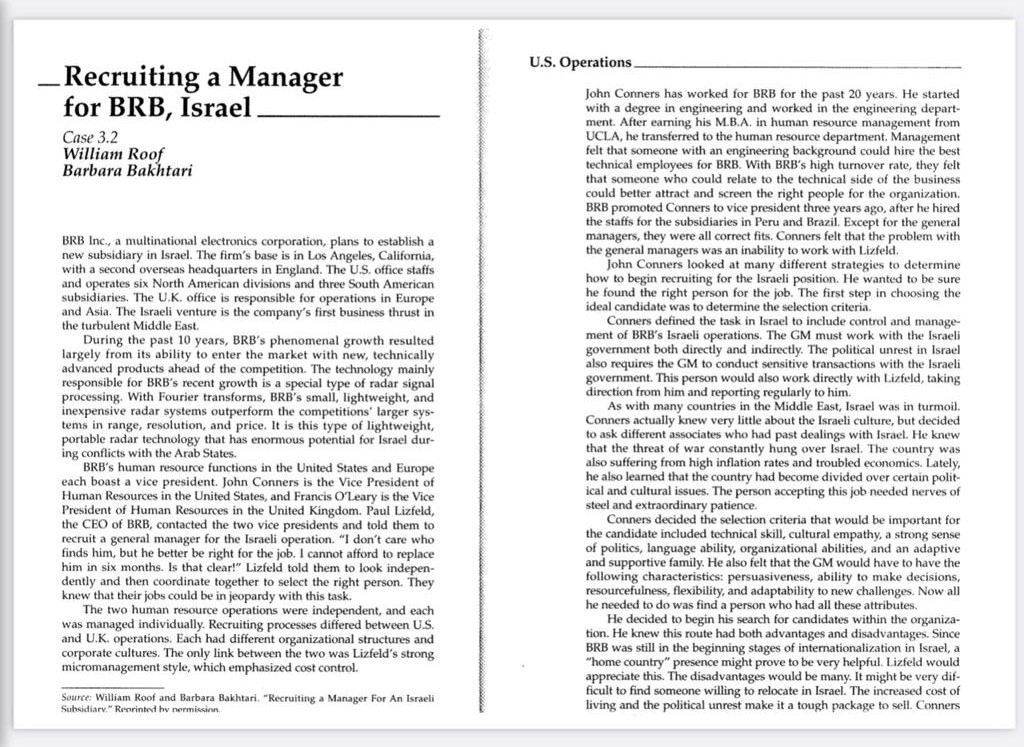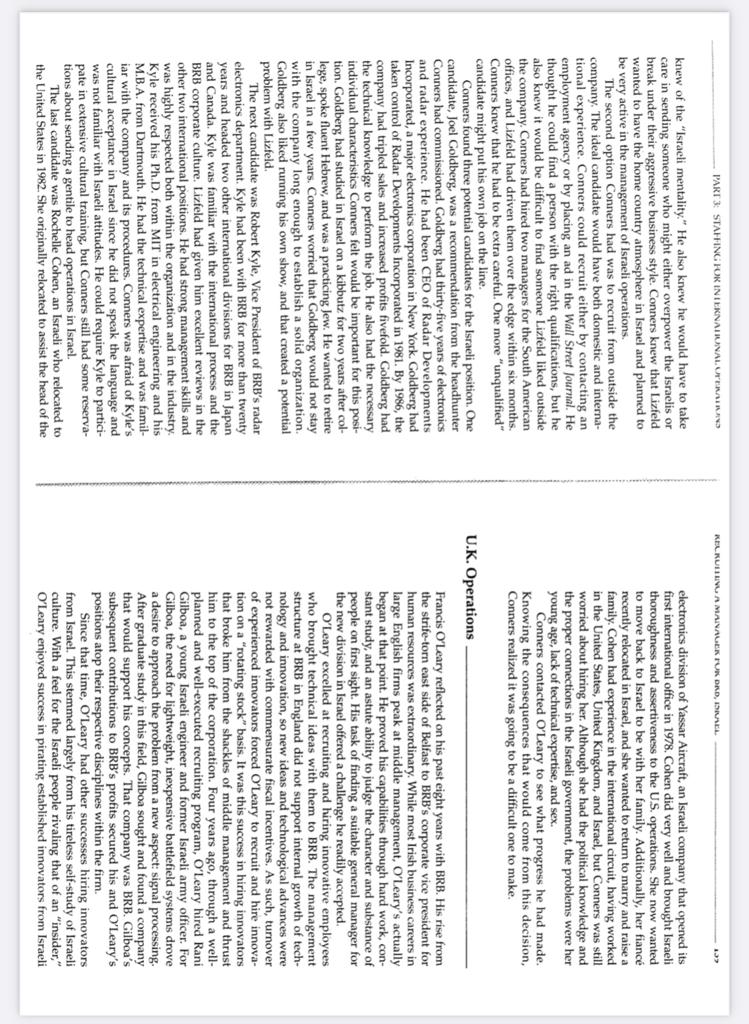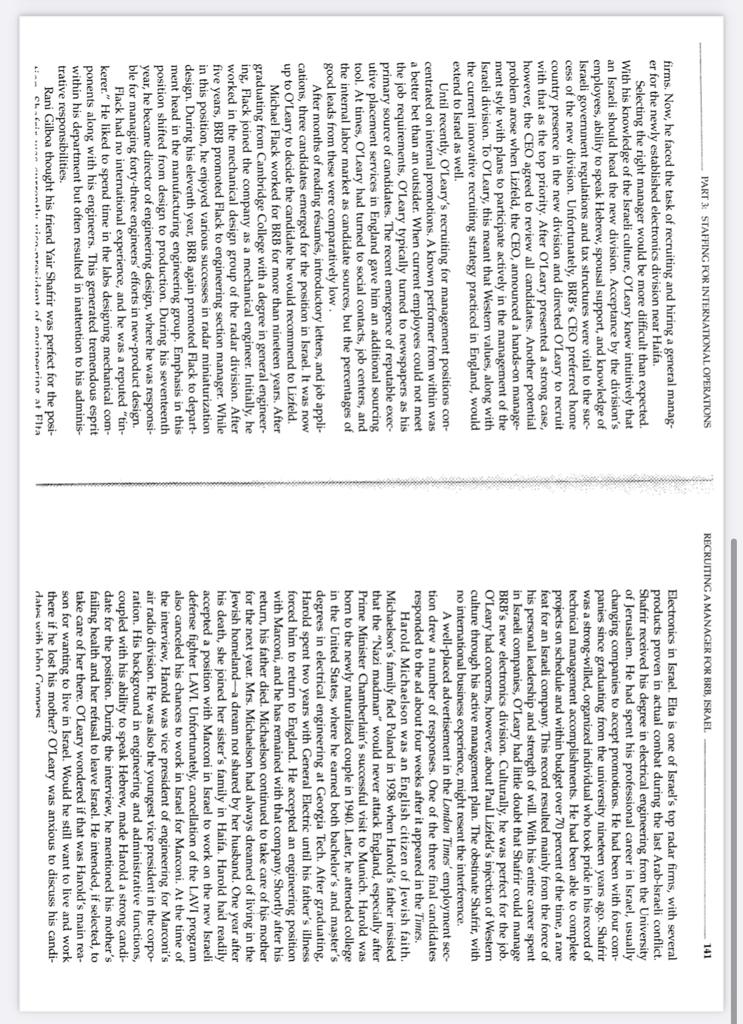Recruiting a Manager U.S. Operations. for BRB, Israel John Conners has worked for BRB for the past 20 years. He started with a degree in engineering and worked in the engineering depart- ment. After earning his M.B.A. in human resource management from Case 3.2 UCLA, he transferred to the human resource department. Management William Roof felt that someone with an engineering background could hire the best Barbara Bakhtari technical employees for BRB. With BRB's high turnover rate, they felt that someone who could relate to the technical side of the business could better attract and screen the right people for the organization. BRB promoted Conners to vice president three years ago, after he hired the staffs for the subsidiaries in Peru and Brazil. Except for the general BRB Inc., a multinational electronics corporation, plans to establish a managers, they were all correct fits, Conners felt that the problem with new subsidiary in Israel. The firm's base is in Los Angeles, California, the general managers was an inability to work with Lizfeld. with a second overseas headquarters in England. The U.S. office staffs John Conners looked at many different strategies to determine and operates six North American divisions and three South American how to begin recruiting for the Israeli position. He wanted to be sure subsidiaries. The U.K. office is responsible for operations in Europe he found the right person for the job. The first step in choosing the and Asia. The Israeli venture is the company's first business thrust in ideal candidate was to determine the selection criteria. the turbulent Middle East. Conners defined the task in Israel to include control and manage- During the past 10 years, BRB's phenomenal growth resulted ment of BRB's Israeli operations. The GM must work with the Israeli largely from its ability to enter the market with new, technically government both directly and indirectly. The political unrest in Israel advanced products ahead of the competition. The technology mainly also requires the GM to conduct sensitive transactions with the Israeli responsible for BRB's recent growth is a special type of radar signal government. This person would also work directly with Lizfeld, taking processing. With Fourier transforms, BRB's small, lightweight, and direction from him and reporting regularly to him. inexpensive radar systems outperform the competitions' larger sys- As with many countries in the Middle East, Israel was in turmoil. tems in range, resolution, and price. It is this type of lightweight, Conners actually knew very little about the Israeli culture, but decided portable radar technology that has enormous potential for Israel dur- to ask different associates who had past dealings with Israel. He knew ing conflicts with the Arab States. that the threat of war constantly hung over Israel. The country was BRB's human resource functions in the United States and Europe also suffering from high inflation rates and troubled economics. Lately, each boast a vice president. John Conners is the Vice President of he also learned that the country had become divided over certain polit- Human Resources in the United States, and Francis O'leary is the Vice ical and cultural issues. The person accepting this job needed nerves of President of Human Resources in the United Kingdom. Paul Lizfeld, steel and extraordinary patience. the CEO of BRB, contacted the two vice presidents and told them to Conners decided the selection criteria that would be important for recruit a general manager for the Israeli operation. "I don't care who the candidate included technical skill, cultural empathy, a strong sense finds him, but he better be right for the job. I cannot afford to replace of politics, language ability, organizational abilities, and an adaptive him in six months. Is that clear!" Lizfeld told them to look indepen- and supportive family. He also felt that the GM would have to have the dently and then coordinate together to select the right person. They following characteristics: persuasiveness, ability to make decisions, knew that their jobs could be in jeopardy with this task. resourcefulness, flexibility, and adaptability to new challenges. Now all The two human resource operations were independent, and each he needed to do was find a person who had all these attributes. was managed individually. Recruiting processes differed between U.S. He decided to begin his search for candidates within the organiza- and U.K. operations. Each had different organizational structures and tion. He knew this route had both advantages and disadvantages. Since corporate cultures. The only link between the two was Lizfeld's strong BRB was still in the beginning stages of internationalization in Israel, a micromanagement style, which emphasized cost control. "home country" presence might prove to be very helpful. Lizfeld would appreciate this. The disadvantages would be many. It might be very dif- Source: William Roof and Barbara Bakhtari. "Recruiting a Manager For An Israeli ficult to find someone willing to relocate in Israel. The increased cost of Subsidiary. " Reprinted hy permission. living and the political unrest make it a tough package to sell. ConnersPART 3: STAFFING FOR INTERNATIONAL UTERAINASS BEL RULING A MANAGER FOR DRD, BRAEL knew of the "Israeli mentality." He also knew he would have to take electronics division of Yassar Aircraft, an Israeli company that opened its care in sending someone who might either overpower the Israelis or first international office in 1978. Cohen did very well and brought Israeli break under their aggressive business style. Conners knew that Lizfeld thoroughness and assertiveness to the US. operations. She now wanted wanted to have the home country atmosphere in Israel and planned to to move back to Israel to be with her family. Additionally, her fiance be very active in the management of Israeli operations. recently relocated in Israel, and she wanted to return to marry and raise a The second option Conners had was to recruit from outside the family. Cohen had experience in the international circuit, having worked company. The ideal candidate would have both domestic and interna- in the United States, United Kingdom, and Israel, but Conners was still tional experience. Conners could recruit either by contacting an worried about hiring her. Although she had the political knowledge and employment agency or by placing an ad in the Wall Street Journal. He the proper connections in the Israeli government, the problems were her thought he could find a person with the right qualifications, but he young age, lack of technical expertise, and sex. also knew it would be difficult to find someone Lizfeld liked outside Conners contacted O'Leary to see what progress he had made. the company. Conners had hired two managers for the South American Knowing the consequences that would come from this decision, offices, and Lizfeld had driven them over the edge within six months. Conners realized it was going to be a difficult one to make. Conners knew that he had to be extra careful. One more "unqualified" candidate might put his own job on the line. Conners found three potential candidates for the Israeli position. One U.K. Operations candidate, Joel Goldberg, was a recommendation from the headhunter Conners had commissioned. Goldberg had thirty-five years of electronics and radar experience. He had been CEO of Radar Developments Francis O'leary reflected on his past eight years with BRB. His rise from Incorporated, a major electronics corporation in New York. Goldberg had the strife-torn east side of Belfast to BRB's corporate vice president for taken control of Radar Developments Incorporated in 1981. By 1986, the human resources was extraordinary. While most Irish business careers in company had tripled sales and increased profits fivefold. Goldberg had large English firms peak at middle management, O'leary's actually began at that point. He proved his capabilities through hard work, con- the technical knowledge to perform the job. He also had the necessary stant study, and an astute ability to judge the character and substance of individual characteristics Conners felt would be important for this posi- tion. Goldberg had studied in Israel on a kibbutz for two years after col- people on first sight. His task of finding a suitable general manager for the new division in Israel offered a challenge he readily accepted. lege, spoke fluent Hebrew, and was a practicing Jew. He wanted to retire in Israel in a few years. Conners worried that Goldberg would not stay O'leary excelled at recruiting and hiring innovative employees who brought technical ideas with them to BRB. The management with the company long enough to establish a solid organization. Goldberg also liked running his own show, and that created a potential structure at BRB in England did not support internal growth of tech- problem with Lizfeld. nology and innovation, so new ideas and technological advances were The next candidate was Robert Kyle, Vice President of BRB's radar not rewarded with commensurate fiscal incentives. As such, turnover electronics department. Kyle had been with BRB for more than twenty of experienced innovators forced O'leary to recruit and hire innova- years and headed two other international divisions for BRB in Japan tion on a "rotating stock" basis. It was this success in hiring innovators that broke him from the shackles of middle management and thrust and Canada. Kyle was familiar with the international process and the him to the top of the corporation. Four years ago, through a well- BRB corporate culture. Lizfeld had given him excellent reviews in the other two international positions. He had strong management skills and planned and well-executed recruiting program, O'leary hired Rani was highly respected both within the organization and in the industry. Gilboa, a young Israeli engineer and former Israeli army officer. For Kyle received his Ph.D. from MIT in electrical engineering and his Gilboa, the need for lightweight, inexpensive battlefield systems drove M.B.A. from Dartmouth. He had the technical expertise and was famil a desire to approach the problem from a new aspect: signal processing. iar with the company and its procedures. Conners was afraid of Kyle's After graduate study in this field, Gilboa sought and found a company cultural acceptance in Israel since he did not speak the language and that would support his concepts. That company was BRB. Gilboa's subsequent contributions to BRB's profits secured his and O'leary's was not familiar with Israeli attitudes. He could require Kyle to partici- positions atop their respective disciplines within the firm. pate in extensive cultural training, but Conners still had some reserva- tions about sending a gentile to head operations in Israel. Since that time, O'leary had other successes hiring innovators The last candidate was Rochelle Cohen, an Israeli who relocated to from Israel. This stemmed largely from his tireless self-study of Israeli culture. With a feel for the Israeli people rivaling that of an "insider," the United States in 1982. She originally relocated to assist the head of the O'leary enjoyed success in pirating established innovators from Israeli- PART & STAFFING FOR INTERNATIONAL OPERATIONS RECRUITING A MANAGER FOR BRB, ISRAEL 141 firms. Now, he faced the task of recruiting and hiring a general manag- Electronics in Israel. Elta is one of Israel's top radar firms, with several er for the newly established electronics division near Haifa. products proven in actual combat during the last Arab-Israeli conflict. Selecting the right manager would be more difficult than expected. Shafrir received his degree in electrical engineering from the University With his knowledge of the Israeli culture, O'Leary knew intuitively that of Jerusalem. He had spent his professional career in Israel, usually an Israeli should head the new division. Acceptance by the division's changing companies to accept promotions. He had been with four com- employees, ability to speak Hebrew, spousal support, and knowledge of panies since graduating from the university nineteen years ago. Shafrir Israeli government regulations and tax structures were vital to the suc- was a strong-willed, organized individual who took pride in his record of cess of the new division. Unfortunately, BRB's CEO preferred home technical management accomplishments. He had been able to complete country presence in the new division and directed O'leary to recruit projects on schedule and within budget over 70 percent of the time, a rare with that as the top priority. After O'leary presented a strong case, feat for an Israeli company. This record resulted mainly from the force of however, the CEO agreed to review all candidates. Another potential his personal leadership and strength of will. With his entire career spent problem arose when Lizfeld, the CEO, announced a hands-on manage- in Israeli companies, O'Leary had little doubt that Shafrir could manage ment style with plans to participate actively in the management of the BRB's new electronics division. Culturally, he was perfect for the job. Israeli division. To O'Leary, this meant that Western values, along with O'leary had concerns, however, about Paul Lizfeld's injection of Western the current innovative recruiting strategy practiced in England, would culture through his active management plan. The obstinate Shafrir, with extend to Israel as well. no international business experience, might resent the interference. Until recently, O'leary's recruiting for management positions con- A well-placed advertisement in the London Times' employment sec- centrated on internal promotions. A known performer from within was tion drew a number of responses. One of the three final candidates a better bet than an outsider. When current employees could not meet responded to the ad about four weeks after it appeared in the Times. the job requirements, O'leary typically turned to newspapers as his Harold Michaelson was an English citizen of Jewish faith. primary source of candidates, The recent emergence of reputable exec- Michaelson's family fled Poland in 1938 when Harold's father insisted utive placement services in England gave him an additional sourcing that the "Nazi madman" would never attack England, especially after tool. At times, O'leary had turned to social contacts, job centers, and Prime Minister Chamberlain's successful visit to Munich. Harold was the internal labor market as candidate sources, but the percentages of born to the newly naturalized couple in 1940. Later, he attended college good leads from these were comparatively low . in the United States, where he earned both bachelor's and master's After months of reading resumes, introductory letters, and job appli- degrees in electrical engineering at Georgia Tech. After graduating, cations, three candidates emerged for the position in Israel. It was now Harold spent two years with General Electric until his father's illness up to O'Leary to decide the candidate he would recommend to Lizfeld forced him to return to England. He accepted an engineering position Michael Flack worked for BRB for more than nineteen years. After with Marconi, and he has remained with that company. Shortly after his graduating from Cambridge College with a degree in general engineer- return, his father died. Michaelson continued to take care of his mother ing, Flack joined the company as a mechanical engineer. Initially, he for the next year. Mrs. Michaelson had always dreamed of living in the worked in the mechanical design group of the radar division. After Jewish homeland-a dream not shared by her husband. One year after five years, BRB promoted Flack to engineering section manager. While his death, she joined her sister's family in Haifa. Harold had readily in this position, he enjoyed various successes in radar miniaturization accepted a position with Marconi in Israel to work on the new Israeli design. During his eleventh year, BRB again promoted Flack to depart- defense fighter LAVI. Unfortunately, cancellation of the LAVI program ment head in the manufacturing engineering group. Emphasis in this also canceled his chances to work in Israel for Marconi. At the time of position shifted from design to production. During his seventeenth the interview, Harold was vice president of engineering for Marconi's year, he became director of engineering design, where he was responsi- air radio division. He was also the youngest vice president in the corpo- ble for managing forty-three engineers' efforts in new-product design. ration. His background in engineering and administrative functions, Flack had no international experience, and he was a reputed "tin- coupled with his ability to speak Hebrew, made Harold a strong candi- kerer." He liked to spend time in the labs designing mechanical com- date for the position. During the interview, he mentioned his mother's ponents along with his engineers. This generated tremendous esprit failing health and her refusal to leave Israel. He intended, if selected, to within his department but often resulted in inattention to his adminis- take care of her there. O'leary wondered if that was Harold's main rea- trative responsibilities. son for wanting to live in Israel. Would he still want to live and work Rani Gilboa thought his friend Yair Shafrir was perfect for the posi- there if he lost his mother? O'leary was anxious to discuss his candi- Ham Chofads men summonsly wire.president of engineering at Flta dates with Inhn Conners









